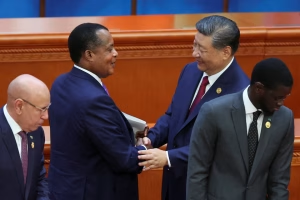DADU: Shamila, who was 14 years old, and Amina, who was 13 years old, were married off in exchange for money as Pakistan was about to experience monsoon rains. Their parents made this decision to help the family survive the possibility of flooding.
After getting married to a man twice her age in the hope of having a better life, Shamila told AFP, “I was happy to hear I was getting married… I thought my life would become easier.”
“However, I lack anything else. And I’m afraid that the rain will make things even worse, if that’s even possible.”
In recent years, Pakistan’s high rate of marriages between underage girls had been decreasing, but rights activists warn that this is changing after 2022’s unprecedented floods because of climate-driven economic insecurity.
Scientists say that climate change is making the summer monsoon, which lasts from July to September and is essential to the livelihoods of millions of farmers as well as food security, heavier and longer, increasing the likelihood of landslides, floods, and long-term crop damage.
In the agricultural region of Sindh, many villages have not recovered from the floods of 2022, which submerged a third of the country, displaced millions, and destroyed harvests.
Mashooque Birhmani, the founder of the non-governmental organization Sujag Sansar, which collaborates with religious scholars to combat child marriage, stated, “This has led to a new trend of ‘monsoon brides.'”
“Families will find a way to survive in any way. Giving their daughters up for marriage in exchange for money is the first and most obvious tactic.
According to Birhmani, child marriage has increased since the floods of 2022 in villages in the Dadu district, one of the worst-hit areas that for months resembled a lake.
Since the previous monsoon, 45 underage girls have become wives in Khan Mohammad Mallah village, where Shamila and Amina were married in a joint ceremony in June. Of these, 15 were married in May and June of this year.
Also Read:iphone-16-cameras-release-date/
Mai Hajani, a 65-year-old village elder, stated, “Before the 2022 rains, there was no such need to get girls married so young in our area.”
The men would be engaged in fishing and agriculture, while they would work on the land and make rope for wooden beds. There was always something to accomplish.
Typically in exchange for money, parents told AFP that they rushed their daughters’ marriages to save them from poverty.
Bibi Sachal, Shamila’s mother-in-law, stated that they gave the young bride’s parents Rs200,000, or $720. This is a significant sum in a region where the majority of families live on less than $1 per day.
Najma Ali was initially swept up in the excitement of becoming a wife when she married at the age of 14 in 2022 and began living with her in-laws, as is customary in Pakistan. “I thought I would get lipstick,” she said.
“For our wedding, my husband gave my parents Rs250,000. She responded, “But it was on loan (from a third party) that he has no way of repaying now.”
She told AFP while cradling her six-month-old child, “I thought I would get lipstick, makeup, clothes, and crockery.”
On August 3, 2024, Najma Ali, a monsoon bride who was married while underage, makes flatbread outside her hut in the Khan Muhammad Mallah village of the Dadu district. On August 3, 2024, Najma Ali, a monsoon bride who was married while underage, makes flatbread outside her hut in the Khan Muhammad Mallah village of the Dadu district. “Now I am back home with a husband and a baby because we have nothing to eat,” according to the AFP.
Their village in the Main Nara Valley, on the banks of a canal, is barren. There are no fish in the polluted water, and its stench is overwhelming.
Hakim Zaadi, the village matron and Najma’s mother, 58, stated, “We had lush rice fields where girls used to work.”
At the Khan Muhammad Mallah village in the Dadu district, Hakim Zaadi (L), the village matron and mother of Najma Ali (not pictured), a monsoon bride who was married while underage, rides a boat with her husband, Babiho Mallah (C). AFP Hakim Zaadi (L), the village matron and mother of Najma Ali (not pictured), a monsoon bride who was married before she was 18 years old, travels in a boat with her husband, Babiho Mallah (C), along a canal in the Khan Muhammad Mallah village in the Dadu district. – According to AFP, “They would grow a lot of vegetables, which are now all dead because the ground water is poisonous.” Especially after 2022, this has happened,” she added.
We didn’t have to deal with the girls before. Girls used to get married when they were young; now, they have five children and return to live with their parents because their husbands are unemployed.
On August 3, 2024, Hakim Zaadi (C), the village matron and mother of Najma Ali (R), a monsoon bride who was married before she was 18 years old, hands out flatbread to children outside her hut in Khan Muhammad Mallah village in the Dadu district. On August 3, 2024, AFP Hakim Zaadi (C), the village matron and mother of Najma Ali (R), a monsoon bride who was married before she was 18 years old, hands out flatbread to children outside her hut at Khan Muhammad Mallah village in the Dadu district. According to government data released in December, child marriages are common in parts of Pakistan, which has the sixth-highest number of girls married before the age of 18 worldwide. AFP: “I want to study”
In various regions, the legal age for marriage varies from 16 to 18, but the law is rarely enforced.
On August 3, 2024, Sabahi Ali (L), a monsoon bride who was married while she was underage, and her husband Dilsher Ali react at the Khan Muhammad Mallah village in the Dadu district. – On August 3, 2024, AFP Sabahi Ali (L), a monsoon bride who was married while she was underage, and her husband Dilsher Ali react at Khan Muhammad Mallah village in the Dadu district. – Although “significant progress” has been made in reducing child marriage, extreme weather events put girls at risk, according to AFP Unicef.
After the floods of 2022, a report stated, “We would expect to see an 18% increase in the prevalence of child marriage, equivalent to erasing five years of progress.”
After being displaced by the floods, Dildar Ali Sheikh, 31, had planned to marry his eldest daughter Mehtab while living in an aid camp.
The daily wage laborer told AFP, “When I was there, I thought to myself “we should get our daughter married so at least she can eat and have basic facilities.””
Mehtab had just turned ten.
Sumbal Ali Sheikh, her mother, who married when she was 18 years old, stated, “I couldn’t sleep the night I decided to get her married.”
Mehtab was enrolled in a sewing workshop as a result of the intervention of the non-governmental organization Sujag Sansar, which resulted in the postponement of the wedding and allowed her to continue her education with a modest income.
She is, however, overcome by the dread that her promised wedding will also take place when the monsoon rains fall.
She stated, “I have informed my father that I want to study.” I don’t want to live a life like this because I see married women around me who have very difficult lives.





